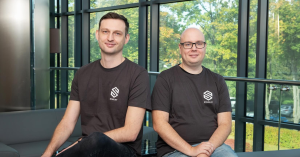Professor Vasilis Vassalos is leading the Information Processing Lab and is the Director of the MSc in Data Science at Athens University of Economics and Business. His research is in the area of data integration, knowledge generation using ML and AI, and task-oriented dialogue agents. He is a member of the AI Commission at the National Technology and Innovation Council. He’s also a director at the US company AISERA, which has an R&D and engineering team in Greece.
Prof. Vassalos studied Electrical and Computer Engineering in Greece and did his Master’s and Ph.D. in Computer Science at Stanford, US. He started his career teaching at NYU until he came back to Greece in 2003. In 2015, he started the first Master’s Degree in Data Science and ML in Greece. In the span of 8 years, more than 300 students graduated from the program and are now working in various AI companies and institutions.
In this interview with The Recursive, prof. Vassalos highlights Greece’s AI talent and why there’s a burgeoning interest in applied research and development. He shares that AI’s future in Greece’s innovation plans involves integrating computational thinking into school curricula, building national AI infrastructure, and leveraging AI-driven solutions in the public sector. When it comes to AI regulation, prof. Vassalos advocates for a balanced approach that encourages innovation while ensuring oversight, particularly in regulating AI applications.
The following interview was conducted as a part of The Recursive’s “State of AI in CEE” report. Download the full report with insights from 40+ experts and an analysis of 900 AI product companies from CEE here.
The Recursive: International databases like Sequoia’s are showing that Greece has a lot of AI talent. Why do you think that is?
Prof. Vasilis Vassalos: Greece has been traditionally overrepresented in computing and electrical engineering. The human capital is strong in Greece, and the educational system despite its problems, works decently well for the upper 10%. People have traditionally excelled in universities, and have gone in larger numbers to major polytechnic schools primarily in the US and the UK. There are a lot of Greeks at MIT and Berkeley, for example.
What are the current roles and the types of skills that AI companies are looking for in Greece?
Traditional Greek companies are primarily looking for generalist data scientists, rather than specialists in LLM or NLP. The main need is for people who can do both data engineering, and model building, data analysis, and visualization. The all-around player is most in demand.
The vast majority of startups and companies with a focus on AI are looking for people who can work with LLMs in all capacities – from prompt engineering to building new LLMs on demand for corporations.
How would you describe the current state of AI research and development in Greece?
It’s excellent. Basic research is in strong competition with the industry for human resources. The students who would otherwise start a Ph.D. are lured by companies who want them fresh out of school. Basic research is finding itself squeezed, the pool of available resources is smaller than it was five years ago. We’re going to see a slowdown in terms of paper production.
However, in the last five years, we have seen an explosion of activity in applied research and development – both from Greek startups and from traditional companies. For example, from electricity providers or companies that produce concrete and other building materials. There are two main drivers behind this. One is the hype, but the other is the publicity around actual results and use cases. There is a lot of shared knowledge about the benefits AI and data science bring that is reaching far and wide outside of the usual suspects.
What place does AI have in Greece’s innovation plans in the next few years?
Greece has not been great in executing long-ranging, far-reaching plans. The National Technology and Innovation Council is creating significant documents with a lot of direction that popularize the issues with the political class but I don’t expect policymakers to actually be able to follow through on a majority of their proposals.
There are a couple of things on the innovation plan where AI is strongly positioned. The most ambitious of those is putting the basic principles of computer science and AI earlier on in the school curricula. Bringing computational and algorithmic thinking will make a huge difference in creating bigger cohorts of computer scientists in the next generations. This part of the innovation plan has a very good chance of being implemented and is very high on the priorities of the government.
Another area where I see AI being prioritized is building infrastructure – national infrastructure that has resources for training and building large models and doesn’t rely on the US tech behemoths to be able to experiment and do research in the area. Greece has committed to doing its part to build resources – large GPU clusters, etc., to make available to Greek researchers.
The third area that will have a positive impact on AI innovation in the next 3 years is the commitment from multiple ministries to employ AI-driven solutions. The big Greek public sector use of AI will give use cases and potential customers to R&D efforts, primarily from the private sector but it will also give an indirect push to universities and researchers to do applied research in areas like tax evasion, flood monitoring, fire monitoring, education, policing, HR for the public sector.
Do you observe collaborations or partnerships between startups and research institutions in Greece?
Universities in Greece are not plugged in and in contact with the private sector as in other European countries, but in AI this situation is completely different. There is already a very good collaboration with companies of all sizes, from small startups to large established companies. Every Master’s program in AI and Data Science has some industry component.
I can give an example with the Master’s that I am leading. Every year instead of a Master’s thesis, we have projects given by the industry. The topic and the data sets are provided by them and there is joint supervision by an industry mentor from the company and an academic mentor so that there’s academic merit to the solution.
20 students per year in our full-time program work with around 15 different companies building things. In 20% of the cases, the solutions go to production, especially in startups. In more established companies they serve for internal demos and proof of concepts. These are 60% of the cases. And there’s another 20% where its’ a good solution but for various reasons is not directly applicable to the company that requested it. It’s a food for thought.
But in 80% of the cases – it’s actually applied innovation.
How would you describe the role of The National Council on Technology and Innovation in supporting AI innovation?
The National Council on Technology and Innovation has a very wide mandate. Their focus is primarily on horizontally enabling activities not so much on particular areas.
A significant part of what they have accomplished is to improve the status of tech transfer in Greece – enabling research to be turned into spin-offs and spin-outs. Through the Council’s work, the tech transfer framework has improved significantly.
The Council has been working with the tax authorities on innovation-friendly changes to the tax code and on ensuring that there is funding for basic and applied research on a recurring schedule.
There are special councils, like the one that I am on that is focused on AI policy whose purpose is to make proposals to the Council. The Council then advises the government based on the recommendations in these particular areas.
The special Councils and Commissions, for example on energy and AI, completed their first round of work last year but then the re-election process in Greece started. I have high hopes for the next couple of years to see a lot more sectoral pushes in the innovation plan.
What do you think about AI regulation? Is the European AI Act a step in the right direction?
I am convinced there should be regulation. I am less confident when it comes to what shape the regulation should take. I am also not entirely confident that any regulation will be able to have an impact if the pace of progress continues the way it is right now. Let me explain what I mean by that.
I am one of those folks, who think that the recent developments point to achieving AGI sooner than we previously thought. My estimate is in 10 years, not 50 years. For me as a researcher that’s an extremely exciting prospect. I am like a kid in a candy store.
But I am also very worried about what this will mean for human society. If we reach AGI, superintelligence will not be far behind. The moment we get to AGI, a generally intelligent entity will be able to feed on itself and become smarter than us. After some point, intelligence will be able to make moral judgments on its own. Philosophically speaking we won’t be able to keep it bound to our regulations. It’s like saying that a 5-year-old will know the rules and that it will always follow the rules.
Regulation is absolutely necessary. But I don’t envy the people who have to come up with regulations.
My main recommendation and an obvious one – is to try to balance innovation with oversight. It’s actually self-defeating to stifle innovation. Because it will come from other regions of the world. Even if we manage to regulate very carefully producers in the EU, they will not be strongly regulated elsewhere.
There’s even a joke about that. The US, China, and Europe decided to have a computing competition. All of them were excited. US said: “I’ll bring the software”. China said: “That’s great, I’ll bring the hardware.” Europe said: “That’s terrific, I’ll bring the regulation.”
I am in favor of regulating applications and I think the EU can regulate that effectively because it has clear national boundaries or EU boundaries. Disallowing face recognition and policing sounds like a good regulation to me. Disallowing these systems for the time being in judiciary proceedings even as decision aids is also a great idea.








